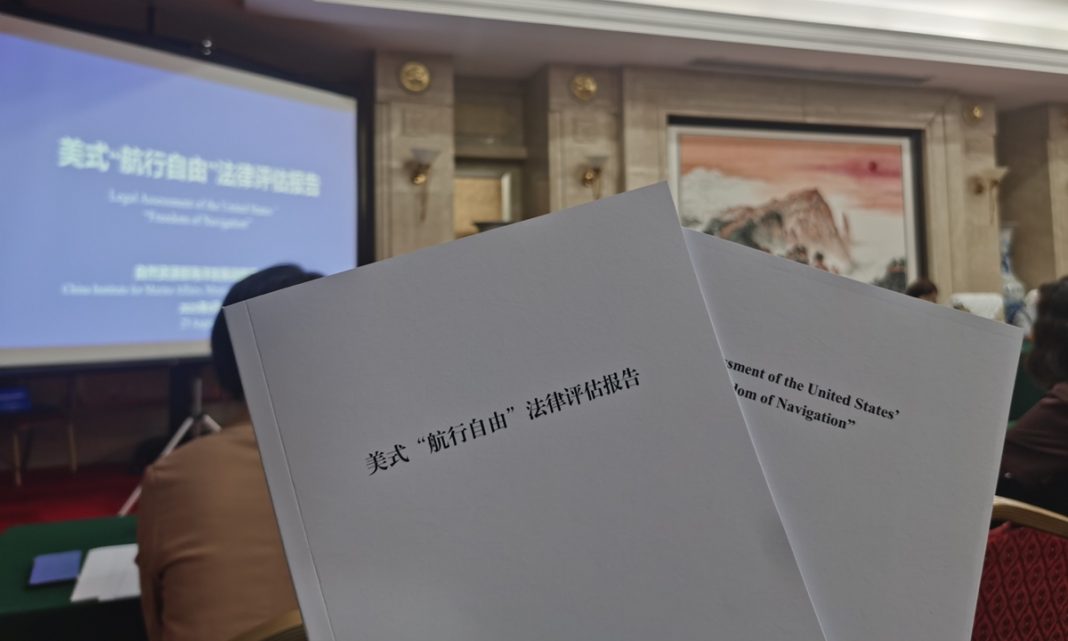BEIJING: The China Institute for Marine Affairs under China’s Ministry of Natural Resources released a legal assessment report on US’ “freedom of navigation,” which concludes that US’ so-called “freedom of navigation” lacks a basis in international law, reflects the US’ habitual practice of using military force to pressure other nations, and distorts the interpretation of international law.
The report finds that US’ “freedom of navigation” incorporates numerous self-created concepts and self-imposed standards of so-called customary international law, which contradict true international law and the practices of many countries. Through these assertions and actions, the US seeks to maximally compress the legitimate rights of other nations while expanding its own rights and freedoms, aiming to secure “freedom” unbound by legal constraints.
Zhang Haiwen, former director general of the China Institute for Marine Affairs under China’s Ministry of Natural Resources, stated at Monday’s press conference that the report aims to expose the US hegemonic practices disguised as lawful, revealing the fragility and untenability of its claimed legality from a professional perspective.
The report examines the US’ legal positions and practices regarding freedom of navigation, particularly statements and actions related to the “Freedom of Navigation Program,” focusing on 11 issues: innocent passage of warships, entry for assistance, transit passage, archipelagic sea lanes passage, “international waters,” legal status of islands, straight baselines, baselines for outlining archipelagos, military activities in exclusive economic zones, air defense identification zones, and historic waters.
Based on these findings, the report concludes that US’ so-called “freedom of navigation” lacks a foundation in international law, severely distorts the interpretation and development of international law, perpetuates the logic of “gunboat diplomacy,” and reflects the US’ habitual use of military force to pressure other nations.
The report highlights that the US has invented several “legal concepts,” such as “international waters,” which lacks a basis in contemporary maritime law, and the so-called “high seas corridor,” which is used to undermine coastal states’ jurisdiction over areas like the Taiwan Straits.
The report also underlines the US’ long-standing double standards.
The US military aircraft insisted on enjoying “freedom of overflight” in other countries’ air defense identification zones (ADIZ) while labeling similar actions by non-allied countries’ military aircraft as “threats.”
For example, while the US emphasizes the “freedom of overflight” for its military aircraft and repeatedly challenges China’s East China Sea ADIZ, including multiple instances of military aircraft transiting the Taiwan Straits, it simultaneously portrays routine Chinese military aircraft activities in international airspace within the ADIZs of the US, Japan, and South Korea as “intrusions” or “provocations.” The US’ double standards on ADIZ issues are clearly inconsistent with its proclaimed commitment to defending “freedom of navigation.”
Disrupting order
Based on these facts, the report believes that US’ so-called “freedom of navigation” serves the country’s national interests and geopolitical strategies, posing a threat to regional peace and stability, disrupting the international maritime order, and embodying clear illegality, unreasonableness, and double standards.
Chen Xidi, an expert at China Institute for Marine Affairs, Ministry of Natural Resources, also one of the report’s authors, told the Global Times that this is the first comprehensive legal assessment of the US’ so-called “freedom of navigation” claims, and the report serves as a significant international public good, defending true navigational freedom under international law.
The report noted that, despite US claims that its South China Sea “freedom of navigation operations” do not target any specific country, statistics show China has been the primary target over the past decade.
Over the recent years, the US has continued to frequently and illegally intrude into sea and airspaces related to China’s sovereignty without authorization. The Chinese People’s Liberation Army (PLA) on August 13 expelled a US warship – USS Higgins destroyer – when it intruded into Chinese territorial waters near Huangyan Dao in the South China Sea without permission from the Chinese government.
On August 11, the US Department of Defense released its 2024 Fiscal Year annual “Freedom of Navigation” (FON) report, identifying China as the top target among 11 countries or regions, with the most “challenged” claims and the only nation facing challenges in multiple maritime areas. These include four challenges to what it claimed as China’s mainland’s “excessive maritime claims,” such as requires prior permission for innocent passage of foreign military ships through the territorial sea, straight baselines, and historic rights in the South China Sea, as well as restrictions in the East China Sea Air Defense Identification Zone.
China’s report is seen as a direct rebuttal to the US military’s claims. Zheng Zhihua, an associate professor at the Japan Research Center of Shanghai Jiaotong University, who is also one of researchers on the report, told the Global Times on Monday that the report systematically reviews US’ “freedom of navigation” practices and legal position since 1979, covering a broad scope, including the dispute over transit passage through the Strait of Hormuz. “Although this issue has no direct connection with China, we remain deeply concerned. In particular, we oppose the improper application of US’ ‘freedom of navigation’ to other maritime areas,” said the researcher.
“We also reject the instrumentalization and weaponization of international law, the excessive expansion of navigation interests, and the improper restriction of the maritime rights of coastal states under the US’ freedom of navigation doctrine,” Zheng stressed.
This report points out that the US’ freedom of navigation operation (FONOP) not only disrupts the good order of coastal states but also often causes unnecessary friction, and in severe cases, leads to maritime and air incidents, threatening the peace and stability of the nations and regions targeted by these actions. –The Daily Mail-Global Times news exchange item





